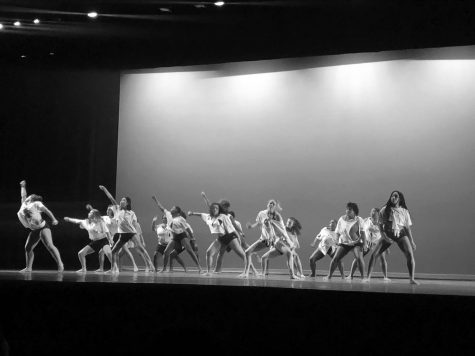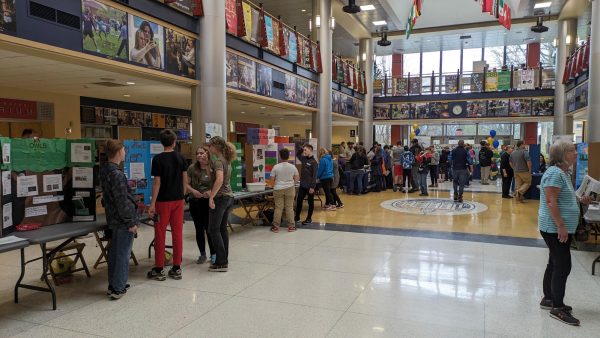ABC awards advancement by Alleghenians
First ever ABC Awards honors Black excellence on campus, beyond

Dancers perform “In Their Footprints They Leave…”, a piece choreographed by Dai’Quan Day, ‘20, on Friday, Feb. 28, at the ABC Awards in Shafer Auditorium.
A month-long campus celebration of Black excellence reached its finale with the Association for the Advancement of Black Culture’s first-ever awards show on Friday, Feb. 28 in Shafer Auditorium in the Henderson Campus Center. The two-hour event honored students, faculty and alumni who have contributed to Black life on campus and after leaving Allegheny.
“The goal was to thank our founders and every person that has come through this school and made it possible for each of us to be here today and every day,” said Kamryn Randall, ’20, president of ABC, referencing the alumni who founded ABC 50 years ago.
Randall, like five other students, both presented awards and received them during the event. A total of 14 Black Excellence student awards were presented throughout the show. Students had the opportunity to nominate their peers in advance for these awards, which were often presented by students who spoke of close personal friendships with the recipient in their introductory speech.
Students received awards for a wide variety of accomplishments, according to Randall.
“Our goal with the student awards was to highlight the diversity of black students on this campus, and to show how one could get an award for a clothing line, and another could get an award for grad school,” Randall said, referencing her own acceptance into law schools as well as Abraham Duncan, ’20, and his clothing line, Never Go Hungry. The line was inspired by raising awareness for food insecurity.
Dai’Quan Day, ’20, was also among the honorees in recognition of his broad involvement on campus in areas including Allegheny College Dance Team. Day’s abilities as a choreographer were displayed in “In Their Footprints They Leave…,” one of the student performances included during the event.
Other performances included “This is New Africa,” a dance piece inspired by traditional African styles of dance and performed by the African Students Association, and a rendition of Nina Simone’s “Feeling Good” by Selena Williams, ’23.
The second half of the show also featured a spoken word piece by Randall, Rosslin Watson, ’22, and Grace Ayole, ’21. The piece centered on themes like the use of women’s bodies, the perception of “mixed” race and being a black woman. Each performer’s segment ended with the refrain “I found god in myself, and I loved her, and I loved her fiercely.”
The final performance of the night, doubling as the show’s finale, was “It’s a Bop and It’s Lit,” a dance performed by the Dance Team.
Awards were presented between performances throughout the night, and the sole faculty award went to Assistant Professor of Community and Justice Studies Heather Moore Roberson. She received the Advocate Award, which Jabriya Hester, ’21, described in her presentation as being given to “a faculty member who continuously chooses to be a supporter and advocate for students of color and marginalized populations on this campus, as well as being a listening ear to all the issues they face on a daily basis.” Both she and co-presenter Ta’Tyana Whitehead, ’21, thanked Roberson for her impact on their lives and pointed to her involvement in bringing Zeta Phi Beta Sorority, Inc. to Allegheny.
“The reason why I am the professor that I am is because I want to be the professor that I didn’t have in college,” Roberson said. “Any and everything that I do here at Allegheny is for the good of the students, the good of the legacy of this institution, but most importantly, I wouldn’t still be at Allegheny if it wasn’t for students like (Hester), (Whitehead), and many others who aren’t in the room today.”
The rest of the evening was dedicated to 11 alumni awards honoring 13 Allegheny graduates.
The first of these was the Conservation of Black History Award presented by Islamic Cultural Association President Abdi Lugundi, ’21, to Carmen Ramsey Ellington, ’86, for making it her “mission to sustain and uplift Black History” in her work. Ellington is now the manager of the Hill House Association, which works to revitalize the predominantly Black Hill District of Pittsburgh, and credited ABC with giving her tools she continues to use.
The next award went to the Rev. Yvonne Seon, Ph.D., ’59, who received the Black Studies Award for her work in bringing Black Studies programs to multiple college and university campuses. Seon was also the first African American woman to join the Unitarian Universalist Parish Ministry.
John Herbert Niles, Ph.D., ’59, received the Pillar Award for being a leader in his field. After attending Howard University School of Medicine, Niles began practicing medicine in 1971, becoming a board-certified OB-GYN. He also serves as an Allegheny trustee and provides aid to the Minority Association of Pre-Health Students.
The Allegheny Herald Award, given in recognition of giving “time and resources to the Allegheny community for the advancement of minority populations,” was awarded to Robert A. Marchman, ’80. Marchman serves as “one of the more hands-on trustee members,” according to presenter and Men of Color Advancement Association Vice President Tonye Hamilton, ’20. Marchman is also special advisor to the head of the Department of Enforcement at the Financial Industry Regulatory Authority. In remarks read by MOCAA President Charles Ross, ’20, Marchman expressed his admiration of the students who organized the event and pointed to their common predecessors.
“We must never forget the shoulders of the many who have toiled and sacrificed, sometimes with their lives, to enable us to have the opportunities for success that we are able to grasp today,” Ross read.
Fields Lee Jackson, Jr., ’80, was also unable to attend, but received the Black Proprietor Award, “bestowed to an alumnus who either founded or is the CEO of a company that is doing well and can inspire other black entrepreneurs to pursue their dreams,” according to presenter and President of International Club Lidia Gebrekirstos, ’21. Jackson is the founder of “Racing Towards Diversity” magazine, a business and education-oriented publication highlighting efforts and initiatives in diversity.
The next alumni award presented was the Big Brother Award, presented to Jermaine Mitchell, ’11, student life coordinator in the Allegheny Residence Life Office. The Macrocosm Award, given to Darius Kenyatta Ellis, The Young Black and Talented Award, given to Jordan Brooks, and the College Bound Award, given to Vincena Allen, were also part of ABC’s effort to recognize alumni, but were not part of the evening’s presentation due to the program running late.
The final award of the evening was the Founder’s Award. While presenting this award, Randall paid tribute to the three founding members of ABC.
“The Founders’ Award goes to those that did the work for us to be here, tonight and every day at this college,” Randall said. “It’s about remembering where we were but also paving a way forward together.”
Calvin Massie, ’71, Yvonne Hobbs Allen, Ph.D., ’72, and Stephonia Keys Owolabi, ’73, recalled their time at Allegheny as some of the only Black students enrolled at the school.
Massie said that when he arrived at Allegheny in fall of 1967, he was one of three Black students in his class and one of four Black students on campus.
“It was a tough break,” Massie said.
By 1969, there were 11 Black students on campus, according to Massie. He and other students, including Allen and Owolabi, began to advocate for change and representation on campus. With the help of the community, they put on the school’s first Black History Week, and received what he said was a positive response.
“We were making students aware of black culture, and that was our point,” Massie said.
By the time he graduated in 1971, he said there was a “whole influx” of 16 or 17 Black students in a single incoming class.
Randall said listening to Massie and the other founders’ stories was one of her favorite parts of the evening.
“I had the opportunity to talk with them before, but it was humbling to be able to stand up there next to them while they talked,” Randall said. “It’s like, I literally would not be here if it weren’t for (them).”
The gratitude she feels for their influence, and for the continuing efforts of multiple members of the Allegheny community, was the driving force behind a months-long planning effort for the awards show, she said.
“I think it was just like to be able to let not only the founders know, but let everyone know that we appreciate (them), and I think we accomplished that,” Randall said.
Olivia Blakeslee is a senior majoring in English with a minor in journalism in the public interest. This is her fourth year on staff, and she is serving...






